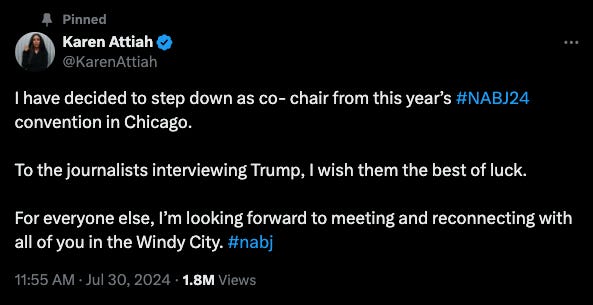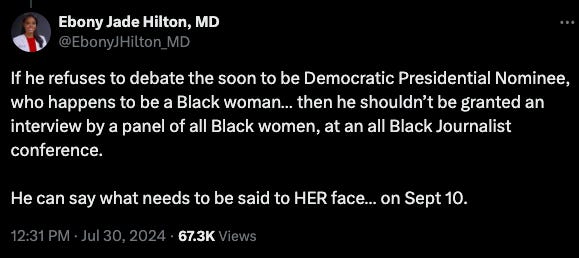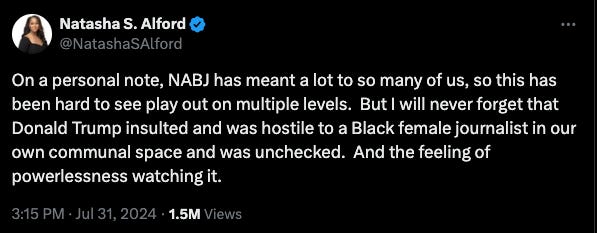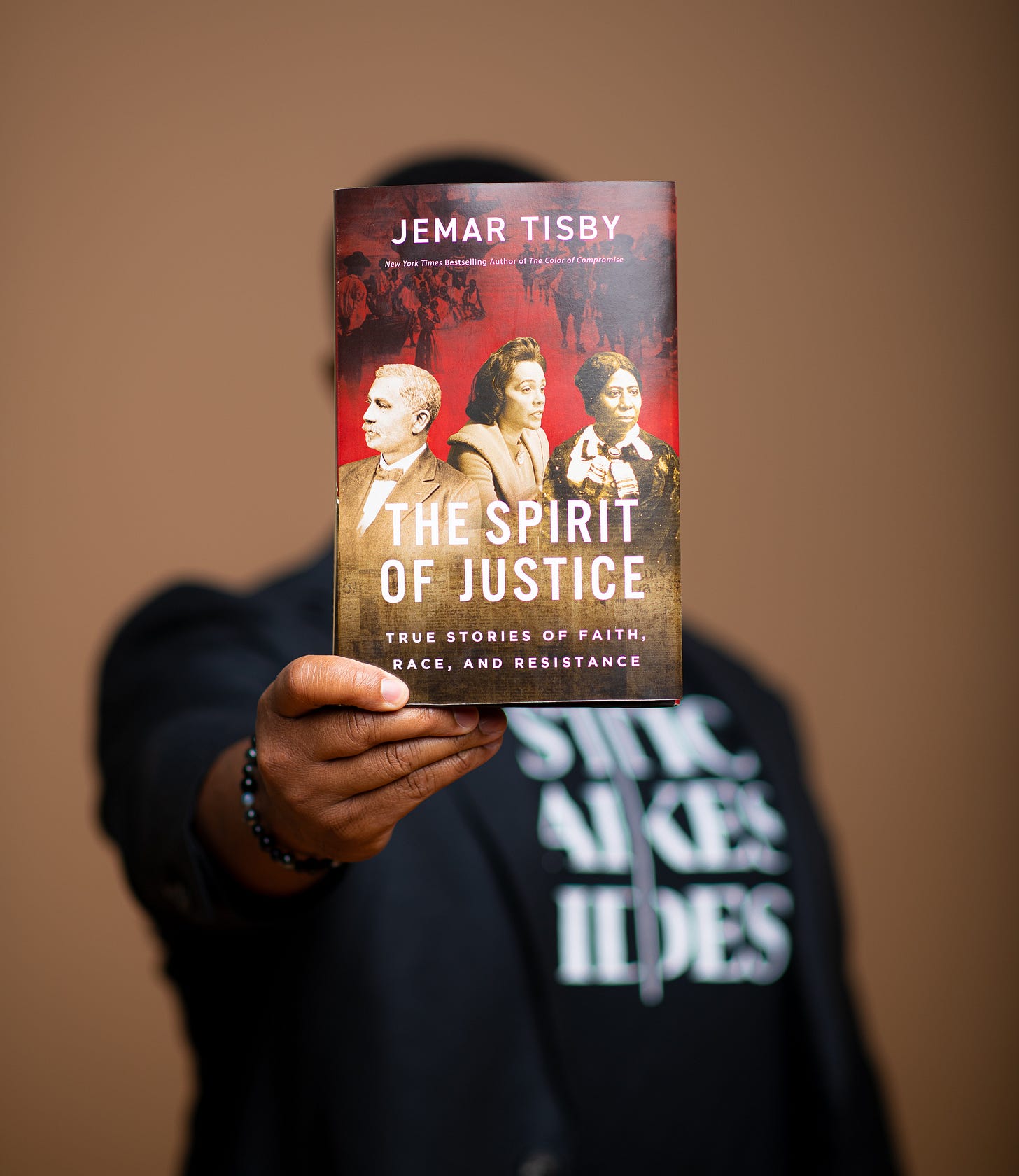When Safe Spaces Are Violated
The glaring issue with NABJ leadership inviting Trump to an interview
The article you’re about to read contains insights you won’t find in a lot of national news outlets. It coms from my experiences as a Black person, a historian, and a racial justice advocate. If you’d like to see more content like this, I’ll need your tangible support. Become a paid subscriber today!
Black people comprise just 13 percent of the total U.S. population.
Though we congregate in certain geographic locations such as the southeast and cities like Detroit, in many instances we are the only Black person or one of just a few.
This diasporic reality is especially true in newsrooms across the country.
A 2023 survey by Pew Research reported that just six percent of all journalists identify as Black.
Meanwhile 76 percent are white, eight percent are Hispanic, and three percent of journalists are Asian.
Black journalists are underrepresented and often overlooked in their fields. So, when the chance comes for Black journalists from around the nation to gather in one location for an event, it’s a big deal.
That’s what the National Association for Black Journalists (NABJ) provides for its members at their annual conference.
Controversy clouded the conference this year because NABJ leadership decided to invite Donald Trump for a main stage interview.
Immediately an online uproar ensued.
People asserted that we all know what Trump would say by now. That there was no constructive purpose in hosting a man who insults Black journalists. And a candidate who has no allegiance to truth or facts cannot helpfully add to the discourse.
There is an argument that other presidents—George W. Bush, Bill Clinton, and Barack Obama—all made appearances and Trump deserved his chance to be heard. Kamala Harris was also invited but could not make it in person, yet the NABJ leadership did not elect to host her that evening via video conference.
Amid the myriad valid objections to Trump’s interview at the NABJ, a yet deeper issue rested at the root of the protests—it was the sense that one of the few safe spaces for Black people had been violated.
The phrase “safe space” has often been maligned as a manifestation of this generation’s “snowflake” mentality. A sign that the modern therapeutic, woke culture can’t handle the slightest offense so they need to retreat to places they’ll be coddled and treated like the precious wimps they are.
That’s not what a safe space is.
A safe space is a community where you can reasonably assume that you will not be re-traumatized by the same injustices society heaps on you.
A safe space is an occasion and a gathering where you can let down your guard, take off your armor, and breathe again.
If you don’t like the phrase safe space, then refuge, retreat, rejuvenate, or re-create all express the core of the concept.
When NABJ leaders invited Donald Trump to their conference, there was a sense that a safe space for Black people had been violated.
The NABJ conference and other Black gatherings such as Essence Fest, the NAACP Image Awards, and the Joy and Justice conference are supposed to be events where Black people can be around others who understand their struggles, triumphs, exuberance, and grief.
Letting a belligerent, abusive, racist, narcissist into the conference and putting him in front of all the attendees for what promised to be a fruitless conversation meant the sacred trust of the event had been compromised.
The space was no longer safe.
The interview, conducted by three Black women journalists, went as poorly as expected. Actually, even worse.
From the very first question—one where Rachel Scott asked Trump why Black voters should vote for him—Trump insulted the journalist, the audience, and the truth.
The first words out of Trump’s mouth were,
“Well, first of all I don’t think I’ve ever been asked a question in such a horrible manner. You don’t even say, ‘hello. How are you?’
Are you with ABC? Because I think they’re a fake news network, a horrible network.
And I think it’s disgraceful that I came here in good spirit. I love the Black population of this country. I’ve done so much for the population of this country.”
It went predictably downhill from there.
Trump continued to insult the journalists onstage, all of whom were Black women, in a painful pattern played out in his attacks on Kamala Harris as a biracial Black woman and the likely nominee for the Democratic presidential candidate.
Now the NABJ leadership has to deal with the breach of trust that resulted from hosting Trump at their conference.
They are a member organization, and so many voices of their members fell on deaf ears in this instance.
It will be a long road to restoring confidence that the NABJ conference can be an event where Black journalists feel seen, protected, and supported.
Safe spaces are not places where people and ideas cannot be challenged. They must simply be spaces where old wounds will not be re-opened and where harms can be healed.
By hosting an interview of Trump at their conference, the NABJ leadership allowed someone who has done much harm to Black people continue to cause wounds and rifts.
Watch the full interview here…
Do you think NABJ leadership should have let Donald Trump be interviewed at their conference? Share your thoughts in the comments below.
P.S. Be sure to pre-order my next book “The Spirit of Justice” today!






Great definition:
"A safe space is a community where you can reasonably assume that you will not be re-traumatized by the same injustices society heaps on you.
A safe space is an occasion and a gathering where you can let down your guard, take off your armor, and breathe again"
Trump's presence was a violation of a safe space, but it was also glimpse into the strength and collective expertise of Black journalists.
Trump thought himself to be the master of the room, but put his "bafoonery" on display at a time when we can also simultaneously witness grace, intelligence, and stability in VP Kamala Harris.
They put Trump on the record at a neutral location where he never appears, far from his usual sycophantic havens.
Jemar, I deeply appreciate your explanation about what safe spaces mean. I have the disturbing realization that as a middle class white person born in 1954, I have experienced most of my life in a "safe" space. By virtue of the color of my skin, I have not been traumatized by the same injustices that have been heaped upon black people by people of my race.
Thank you so much for posting the video of this interview. I confess I had not heard of the NABJ prior to the news of this interview. Once again, you have helped to widen my knowledge, my worldview and my perspective. I appreciate and respect that the NABJ continued its tradition of inviting Presidential candidates and invited Trump, knowing that the interview would probably go just the way it went. The skilled moderators asked expressly appropriate and legitimate questions for a former President and current presidential candidate. (I wish they had asked him about his comments about never having to vote again if he wins this election) The interview was not fruitless - it revealed more of what we already knew about Trump: that he can state the problems, but has absolutely no valid policy solutions to offer for those problems. All he has to offer is shame, blame, and attack on the very people he hopes to pursuade to vote for him. I appreciate the NABJ for shining a spotlight on his complete and total incompetence. As a result, I - like Jonathan - am more galvanized than ever to work by white woman's butt off to make sure that Kamala Harris is our next President!